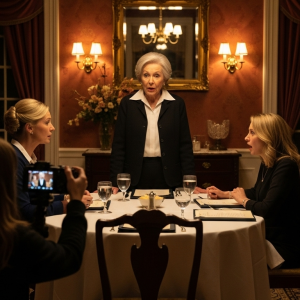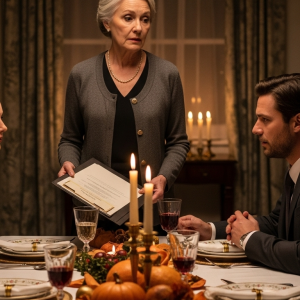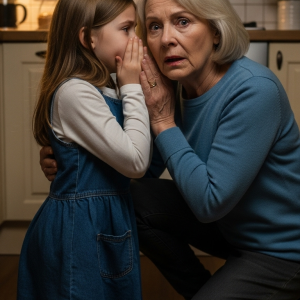Before you judge me, let me tell you how I got here. On my 62nd birthday, I thought I was going out for lunch. I wore my best sweater and even did my hair. But instead of cake and laughter, I was handed a suitcase and abandoned. They say a mother’s love is unconditional. I believed that. I lived that. Every scraped knee, every sleepless night, I was there for Brandon, my only son.
I woke up on my birthday with a flutter of anticipation in my chest. Brandon hadn’t called much lately; he said work was hectic, that things with his wife were tense. But surely, he’d show up today. I made pancakes, his favorite, and even set two plates. By 2 p.m., I was still alone, my heart sinking with each passing hour.
Then, the doorbell rang. It was Brandon, holding a small grocery store bouquet, that boyish grin on his face he always used when he wanted something. “Happy birthday, Mom,” he said, giving me a stiff pat on the back. “Get dressed. I made lunch reservations.”
I didn’t question it. I felt giddy, grabbing my coat and the shoes that always pinched my toes but looked nice. We didn’t drive toward the city. We pulled into a place with a long driveway lined with maple trees. I looked up at the sign and felt my stomach twist: Willow Pines Senior Living Facility.
“Brandon, what is this?”
He cleared his throat. “Mom, we need to talk. This isn’t safe anymore. You live alone, and with your memory lapses…”
“What memory lapses?” I snapped.
“I found a great place,” he continued, his voice smooth and practiced. “It’s safe, comfortable. You’ll have people your own age, activities.”
I laughed, a bitter sound that didn’t feel like my own. “You’re kidding. You brought me here on my birthday?” He got out of the car, and that’s when he opened the trunk. My suitcase was already packed. I stared at it, frozen. “You went through my things.”
“Don’t make this harder than it needs to be,” he sighed.
Inside, the air smelled of antiseptic and overcooked vegetables. He handed over legal papers—a transfer of power of attorney—and just like that, it was done. I didn’t cry. I let them lead me to a room with beige walls, an adjustable bed, and a small window facing a brick wall. My birthday gift was a cage. I sat on the edge of the bed with my coat still on, the cold seeping through my bones.
That night, I lay awake, listening to the quiet rustle of nurses’ shoes on linoleum. I replayed every conversation, trying to see the signs I’d missed. All the times I had loaned him money, made excuses for him, and swallowed my disappointment because I loved him. But that night, something essential cracked inside me. The next morning, a nurse told me my son had disabled my phone line, saying it was “too confusing for me.” It was then I realized I wasn’t here to be cared for. I was here to be erased.
I stopped eating for two days. There’s something about being treated as if you’re no longer useful that breaks a part of you that never fully heals. I had raised a child, built a home, and loved fiercely, and now I was just a room number and a patient chart. The nurses were kind, but their kindness felt like pity. To them, I was just another old woman in slippers.
On the fourth day, I met Ruby. She was a young nurse with kind eyes who was filling in an extra shift. While checking my vitals, she looked at me and said, “You don’t belong here.” I stared at her, startled. “A lot of folks need help,” she clarified, “but you… you don’t seem lost.” I blinked away a sudden sting in my eyes.
Later that day, she came back with something small in her hand. “This belonged to a resident who passed last week,” she whispered, handing me a folded lottery ticket. “We found it tucked inside a Bible. No one claimed it.”
“And you want me to try my luck?” I asked, a dry chuckle escaping my lips.
She winked. “Hey, the world owes you something.”
That night, driven by a strange mix of boredom and desperation, I waited until the hallway was quiet, used one of the facility’s ancient desktops, and typed in the numbers. My hand froze. My eyes scanned the screen again and again. Fifty-six million dollars.

I covered my mouth with both hands, the silence of the empty lounge suddenly deafening. It wasn’t joy I felt. It was pure, electric fear. If Brandon found out, he would take it. I printed the confirmation, folded it small, and tucked it inside my bra. The next day, I told Ruby I needed to speak to a lawyer, privately. She didn’t ask why. She just nodded.
She introduced me to Aaron, a sharp, discreet volunteer attorney. We sat in a tiny breakroom, and I slid him the lottery confirmation. “Can you help me disappear?” I whispered. His eyebrows shot up, but he didn’t flinch. “We’ll need to move fast,” he said.
The next few hours were a blur of paperwork, notarizations, and financial transfers. Aaron set up a blind trust; my name was nowhere on it. He arranged for a new phone and a temporary mailing address. On the night I left, Ruby hugged me. “Don’t forget us when you’re free,” she whispered. I slipped away just before dawn, wearing donated clothes and carrying a duffel bag. They thought I was senile and broken. But I was about to become a ghost with fifty-six million dollars.
The bus ride out of Ohio was long and cold. Aaron had helped me purchase a modest house under the trust’s name in rural Tennessee—off the grid, quiet, and far from the life I was leaving behind. For the first few days, I lived like a shadow, checking the news obsessively, half-expecting to see my face under a headline: Missing Woman Wins Millions; Son Claims Mental Instability. But there was nothing.
Curiosity finally got the better of me. I created a fake Facebook profile and searched for Brandon. There he was, his latest post a plea: If anyone has seen my mother, Margaret Taylor, please contact me. She’s been missing for several days. We’re worried about her safety. Beneath it, hundreds of comments praised him for being such a good son. I laughed so hard I cried.
What truly broke me was the photo he used. It was from five years ago, at my birthday party. We looked happy. It’s so easy to perform love in pictures.
That night, I sat in the darkness, and the memories became clearer. The money I’d given him. The loans I’d co-signed. The way he had subtly gaslit me for years, making me doubt my own mind. “You told me that already, Mom.” “You’re forgetting more and more these days.” It wasn’t aging. It was a strategy. He wanted me to doubt myself so that when he took control, I wouldn’t resist.
I started digging. Aaron helped me request old financial records. What I found made my blood run cold. Brandon had been stealing from me and my late husband, Richard, for years. He had forged our signatures on loan documents, taking out tens of thousands of dollars. Richard must have discovered it and covered most of it, taking the shame and secrets to his grave. But one defaulted loan, for over $80,000, was still active under my name.
This wasn’t just betrayal. This was fraud. I pieced together a puzzle of deceit that stretched back over a decade. He had even used a defunct LLC from a small catering business Richard and I once ran to secure a line of credit, forging Richard’s signature two years after he had died. That was federal fraud.
I saved everything to an encrypted folder. I wasn’t just hiding anymore. I was hunting.
The darkest truth came from a public database search. Aaron’s legal access uncovered it: Brandon Taylor, currently under federal investigation for fraudulent tax filings, embezzlement, and identity misuse.
He had been creating false identities to siphon money through tax refunds. Some of those identities belonged to real people. Including me. For three years, he had filed fraudulent returns in my name. It all made sense now. The nursing home wasn’t about concern. It was about containment. He needed me silenced and out of the way while his world imploded.
The letter arrived in a plain white envelope. No return address. Just one sentence in Brandon’s sharp, slanted handwriting: “I know what you did, and this isn’t over.” A threat, not an apology.
Days later, a certified letter from the Dayton courthouse arrived. He had filed a petition to have me declared mentally incapacitated. The document included falsified statements from supposed friends and edited audio clips of my old voicemails, spliced together to make me sound confused and unstable. He wanted the court to freeze my accounts, seize the trust, and drag me back.
“He’s counting on you to panic,” Aaron said when he arrived that night.
“He’s about to be very disappointed,” I replied.
The next few days were a whirlwind. We gathered documents, scheduled an independent psychiatric evaluation, and prepared for a fight. The psychiatrist, a kind woman named Dr. Lavine, spent three hours with me. “You’re the most lucid person I’ve seen this week,” she said as she left. It was the first real breath I’d taken in days.
But I knew proof wasn’t enough. I needed to shift the narrative. Using an alias, I made a sizable, anonymous donation—$5 million—to a national nonprofit that protects elders from financial abuse. A week later, they launched a media campaign using the details of my case as a symbol. They didn’t name me, but the internet began to connect the dots. The “missing mother” story started to look less like a tragedy and more like a crime.
The courthouse was cold and impersonal. Brandon was already seated, his face a mask of practiced concern. He was here to bury me. His lawyer went first, painting a picture of an erratic, confused old woman who was a danger to herself and her finances. He played the edited audio clips. Listening to my own voice, twisted into a caricature of senility, I felt a cold rage settle in my bones.
Then Brandon spoke, his voice trembling with false emotion. “Your Honor, I love my mother. This is the hardest thing I’ve ever done. But I believe she’s being taken advantage of. She’s not herself.”
“My turn, Your Honor,” I said, standing. The judge nodded.
I walked slowly to the stand. “My name is Margaret Taylor,” I began, my voice clear and strong. “I am sixty-two years old. I am not mentally impaired, I am not lost, and I am not anyone’s victim.”
I methodically handed the judge a copy of Dr. Lavine’s full psychiatric report. Verdict: Completely sound mind, no indicators of cognitive decline. I watched Brandon’s face twitch.
“I also have here,” I continued, lifting a second folder, “a log of every financial and legal decision I have made since my departure from Willow Pines, all certified by my attorney and financial advisor.” I paused, locking eyes with my son. “He put me in a facility without my consent, took my phone, and took my freedom. Now he wants to take my dignity. Don’t let him.”
The courtroom was still. The judge reviewed the documents. “Mrs. Taylor, based on the overwhelming evidence provided, your psychiatric evaluation, and the inconsistencies in the petitioner’s claims, I am dismissing this case. Your financial accounts and personal autonomy are fully restored.”
I walked out of that courtroom with my head held high. The war wasn’t over. But for the first time, I knew I could win it.
The phone call came just after midnight. “It happened,” Aaron said. “The DOJ opened formal proceedings. Brandon’s name is on the docket.” It didn’t feel like a victory. It felt like an inevitability.
The media swarmed. Brandon Taylor, Son of Spotlighted Elder Abuse Case, Under Federal Investigation. The dots were connected. The frail woman who disappeared was now the strong woman who had won in court. I agreed to a single, on-camera interview.
“It’s not just about me,” I told the journalist, looking directly into the camera. “It’s about every parent who gave everything and was thrown away. Every older adult dismissed, erased, or locked up under the excuse of love. I was almost one of them. And I won’t be quiet anymore.”
I told my story. The nursing home, the lottery ticket, the fraud, the court battle. The interview aired, and messages poured in. I wasn’t just Margaret anymore. I was a mirror, reflecting the hidden pain of thousands.
Brandon took a plea deal. Ten years. He tried to send a letter from prison. I returned it unopened. That chapter was closed.
The morning I returned to Willow Pines, the sky was a pale, soft gray. Ruby met me at the door, and we hugged like two soldiers who had survived a war. The facility had been transformed. Using my donations, they had created a bright, vibrant community. The residents were no longer invisible, and neither was I.
I stood in the new activities room and spoke to them. “I want to tell you something I wish someone had told me,” I said, my voice ringing with a strength I never knew I possessed. “You are not a burden. You are not forgotten. And you are not finished.”
When I returned home, I finalized the trust. The Margaret Project would become a national organization, offering legal and financial advocacy for elders. It was my new purpose. On the first snow of January, I wrote a letter to myself.
Dear Margaret, it read. You weren’t crazy. You weren’t weak. You were just a woman who loved too deeply. And when they tried to write you out of your own life, you picked up the pen and wrote the ending yourself. I am so proud of you.
I placed the letter in a small wooden box on the mantle. I didn’t need a legacy of money or revenge. I had something greater. I had freedom. And for the first time in my life, I was finally, fully, and completely free.




